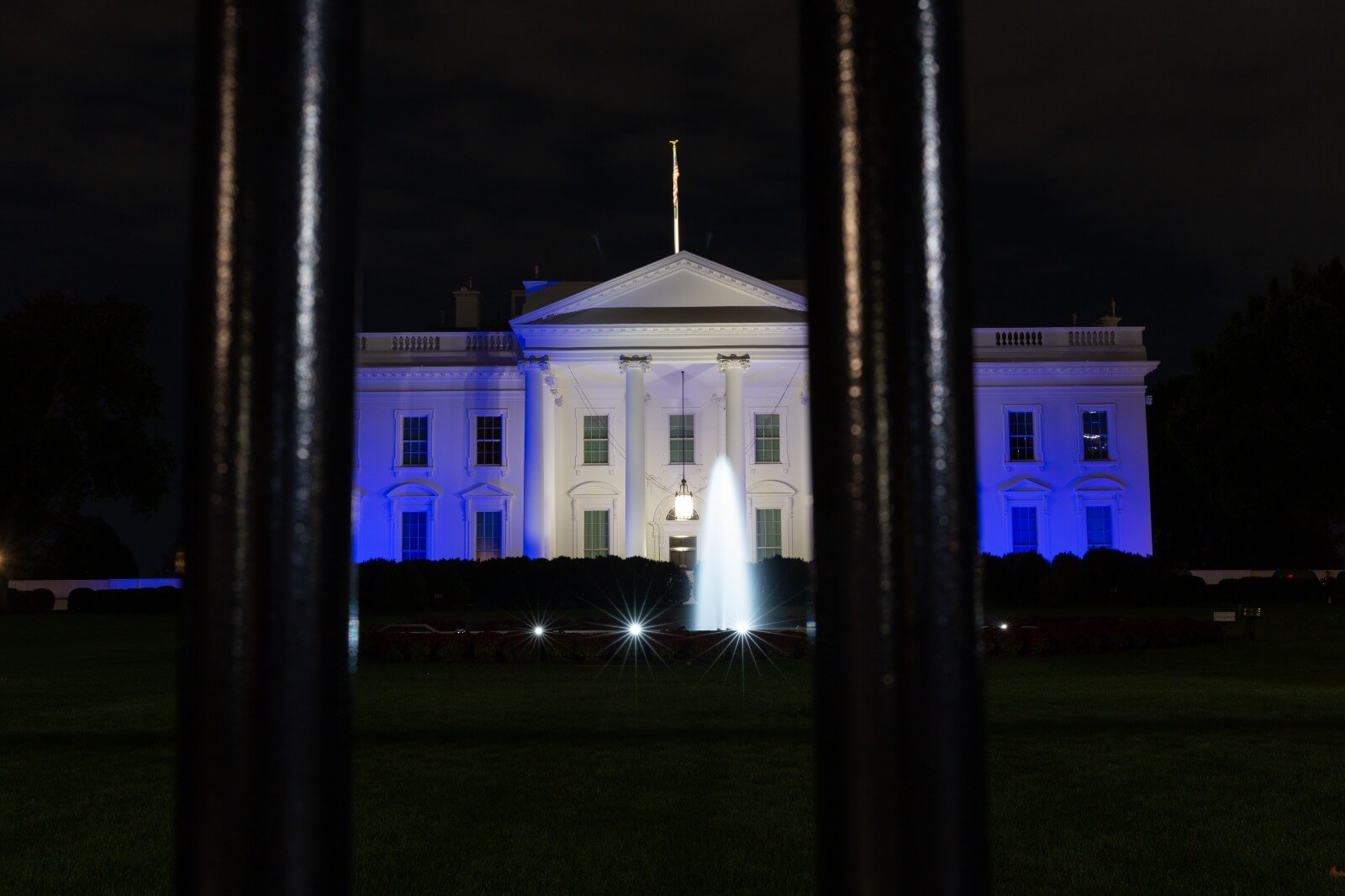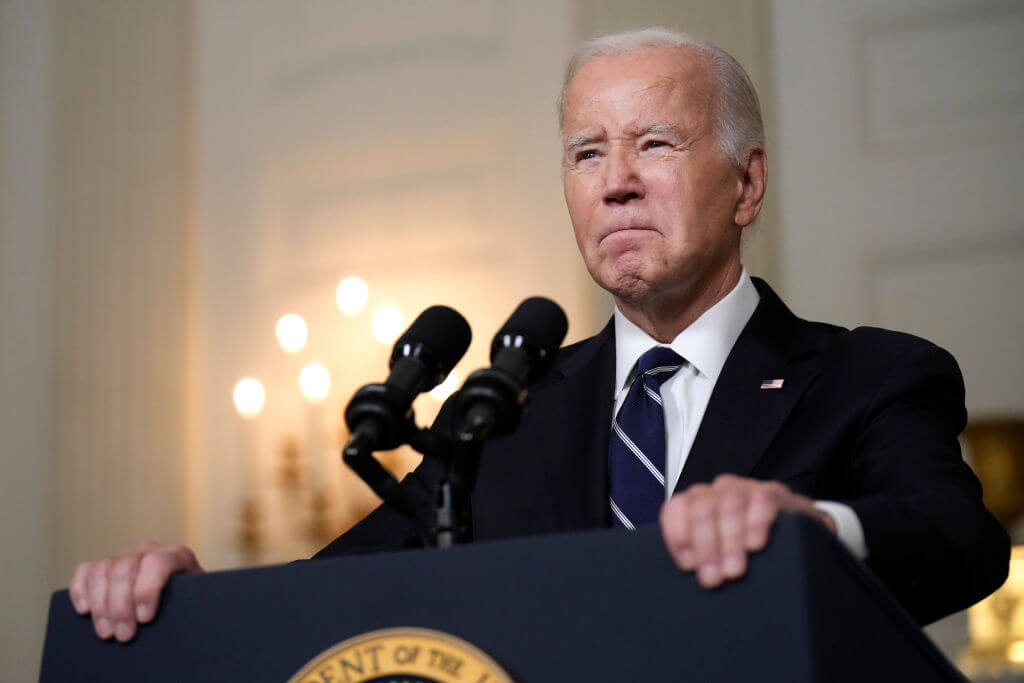In wake of attack on Israel, Biden will join WH roundtable with Jewish leaders to discuss Israel
The president decided to participate after Saturday’s Hamas attacks on Israel

The White House illuminated in blue and white in support of Israel, on Oct. 9, 2023. Photo by Matthew Litman
President Joe Biden will join a roundtable with Jewish leaders at the White House on Wednesday to discuss Hamas’ attack on Israel and combatting antisemitism. The meeting, led by Doug Emhoff, the Jewish husband of Vice President Harris, and senior administration officials was originally organized chiefly to discuss the implementation of the U.S. National Strategy to Counter Antisemitism, which was released in May — and Biden was not slated to attend. But Saturday’s attack, in which more than 1,200 Israeli civilians were killed and more than 100 Israelis taken hostage, prompted a revision in the agenda and Biden’s decision to join the conversation.
Biden, who has already delivered forceful remarks in support of Israel, is expected to reiterate them at the roundtable, according to a White House official who spoke anonymously to share details of the agenda.

Since the attack, Biden has talked with Prime Minister Netanyahu three times to express sympathy and pledge U.S. assistance. He also spoke to Jordan’s King Abdullah II about Israel’s conflict with Hamas, which has now also taken the lives of at least 900 Palestinians. Harris on Sunday spoke with Israeli President Michael Herzog. And Biden on Monday organized a joint statement of support for Israel from the United States, France, Germany, Italy and the United Kingdom.
The plan to combat antisemitism
The White House official said that the roundtable, in addition to Biden and Emhoff, will include several officials who have worked on the strategy to counter antisemitism. They include Neera Tanden, Biden’s domestic policy adviser; Liz Sherwood-Randall, the president’s assistant for homeland security; and Steve Benjamin, the White House’s director of public engagement. Sherwood-Randall and Tanden’s predecessor, Susan Rice, were co-chairs of the interagency task force that developed the plan.
Emhoff often speaks about combating domestic antisemitism on behalf of the administration. He played a pivotal role in the planning and rollout of the national plan and since its release has been traveling the country speaking about it — meeting with government officials and interfaith leaders, and speaking to Jewish students. He addressed several congregations during the High Holidays.
“This coming year,” Emhoff told Jewish leaders at a pre-Rosh Hashanah reception at the vice president’s residence last month, “I’m committed to doing even more, pushing back even more, building more coalitions and bringing more people together in this fight with us, in this fight that affects all of us.”
What’s next?
Wednesday’s discussion will follow the administration’s recent announcement that it had instructed eight federal agencies to extend civil rights protections to victims of antisemitism and religious discrimination. The directive covers the departments of Agriculture, Health and Human Services, Homeland Security, Housing and Urban Development, Interior, Labor, Treasury and Transportation.
The White House shared a spreadsheet of more than two dozen public appearances Emhoff has made to highlight the fight against antisemitism and showcase his Jewish heritage since Harris won the vice presidency in 2020. They include remarks at the United Nations, the installment of mezuzahs at the vice president’s residence, and hosting Rosh Hashanah celebrations and Passover Seders.
In January, Emhoff traveled to Auschwitz for International Holocaust Remembrance Day and to the town in Poland his grandparents fled 120 years ago to escape religious persecution.
He made his most recent remarks on the issue during a chat on Yom Kippur with the rabbis of Congregation Adas Israel in Washington, D.C.
Tanden, who joined the White House after Rice’s departure, has also taken a prominent role in the implementation of the national plan. During a Q&A session after Biden’s annual Rosh Hashanah call with Jewish leaders, Tanden said that more than two dozen agencies are already carrying out the plan and that they have a May 2024 deadline to complete their assigned tasks.
A message from our Publisher & CEO Rachel Fishman Feddersen

I hope you appreciated this article. Before you go, I’d like to ask you to please support the Forward’s award-winning, nonprofit journalism so that we can be prepared for whatever news 2025 brings.
At a time when other newsrooms are closing or cutting back, the Forward has removed its paywall and invested additional resources to report on the ground from Israel and around the U.S. on the impact of the war, rising antisemitism and polarized discourse.
Readers like you make it all possible. Support our work by becoming a Forward Member and connect with our journalism and your community.
— Rachel Fishman Feddersen, Publisher and CEO


























